More choice for parents
The Government of Canada has been working to make EI parental benefits more flexible. Parents with a newborn or newly adopted child can choose from the following two options:
Option 1: Standard parental benefits:
- You can receive standard parental benefits for up to 35 weeks.
- If you share these benefits with the other parent(s), you can receive 5 extra weeks for a total of up to 40 weeks, which can be divided however you choose. One parent cannot receive more than 35 weeks of standard parental benefits.
- You can receive the 40 weeks of benefits during the 12 months after the date your child is born or placed with you for adoption.
- You will receive 55% of your average weekly earnings, to a maximum of $562 per week in 2019.
or
Option 2: Extended parental benefits:
- You can receive extended parental benefits for up to 61 weeks.
- If you share these benefits with the other parent(s), you can receive 8 additional weeks for a total of up to 69 weeks, which can be divided however you choose. One parent cannot receive more than 61 weeks of extended parental benefits.
- You can receive the 69 weeks of benefits during the 18 months after the date your child is born or placed with you for adoption.
- You will receive 33% of your average weekly earnings, to a maximum of $337 per week in 2019.
Once you start receiving parental benefits, you cannot change options.
The extra 5 weeks of standard parental benefits and extra 8 weeks of extended parental benefits are available only to parents of children born or placed with them for adoption on or after March 17, 2019.
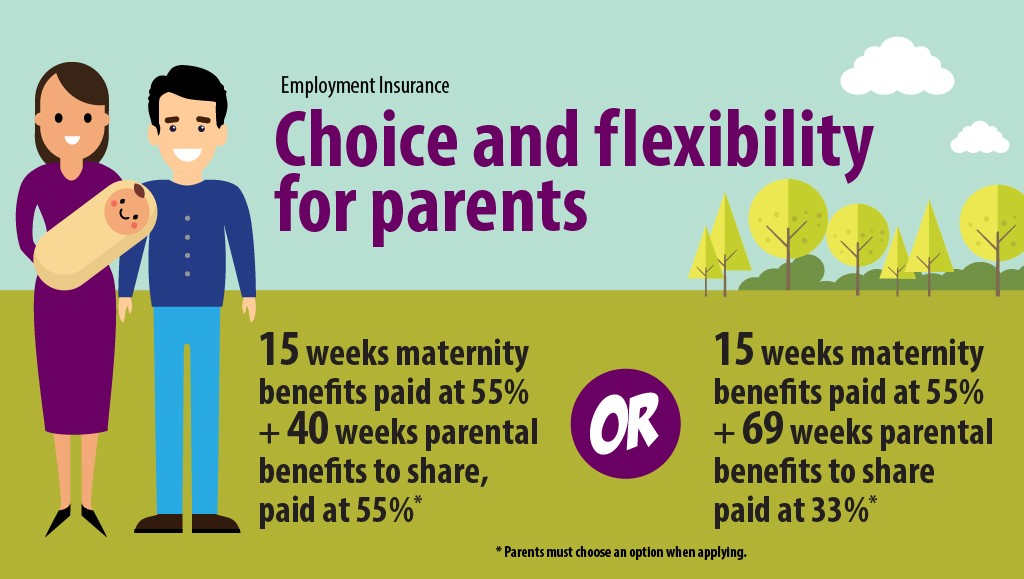
Parents can choose an option based on their own family situation.
When applying for EI, both parents must choose the same option (standard or extended). Each parent must indicate how many weeks they plan to take. Parents can receive benefits at the same time or separately.
Once parents start receiving benefits, they cannot change parental benefit options.
Self-employed people can voluntarily opt into the Employment Insurance program to access special benefits. For more information or to apply, visit EI Special Benefits for Self-Employed People – Overview.
The Québec Parental Insurance Plan offers maternity, parental and adoption benefits, as well as a paternity benefit, to residents of the province of Quebec.
For more information or to apply, visit EI Maternity and Parental Benefits – Overview.
ExamplesFootnote 1
- Example 1: Two parents share parental benefits
- Example 2: Mother employed full-time takes all benefits
- Example 3: Adoptive parents share parental benefits
- Example 4: Mother employed part-time takes all benefits
Example 1
Jessica and Mark are expecting a child. They both work and they each earn a yearly salary of $60,000. They decide to apply for extended parental benefits. They want to share the 69 weeks.
Jessica is eligible for 15 weeks of maternity benefits (paid at 55% of her average weekly earnings). She also chooses to receive 40 weeks of extended parental benefits to care for their baby before returning to work.
Jessica receives $562 per week in maternity benefits for 15 weeks. After that, she receives $337 per week for 40 weeks in extended parental benefits (33% of her average weekly insurable earnings).
In total, she receives $21,910 in maternity and extended parental benefits.
Mark takes leave from work to care for their baby. He receives 29 weeks of extended parental benefits. Since he earned the same salary as Jessica, Mark also receives $337 per week for 29 weeks. In total, he receives $9,773 in parental benefits.
In total, Mark and Jessica receive $31,683 in maternity and parental benefits.
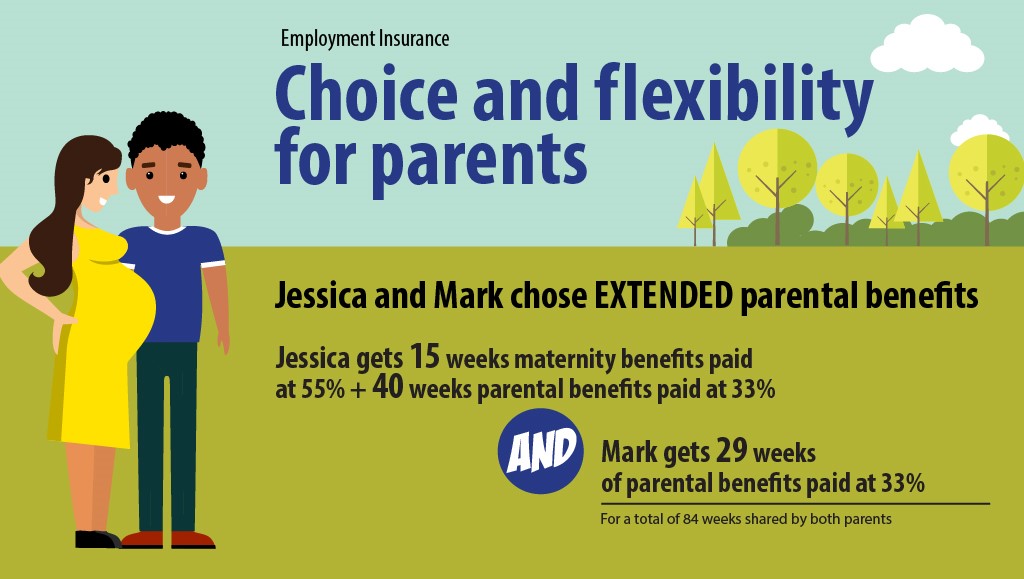
Example 2
Martine and Ibrahim are expecting a child. Martine works full-time and earns $60,000 per year. They have decided that Martine will take the full maternity and parental benefits. Ibrahim is not eligible for EI benefits.
Option 1: Standard parental benefits
Martine receives $562 per week in maternity benefits for 15 weeks; after that, she can receive $562 per week for 35 weeks in standard parental benefits (55% of her average weekly insurable earnings).
In total, she would receive $28,100 in maternity and parental benefits over 12 months.
Option 2: Extended parental benefits
Martine receives $562 per week in maternity benefits for 15 weeks; after that, she can receive $337 per week for 61 weeks in extended parental benefits (33% of her average weekly insurable earnings).
In total, she would receive $28,987 in maternity and parental benefits over 18 months.
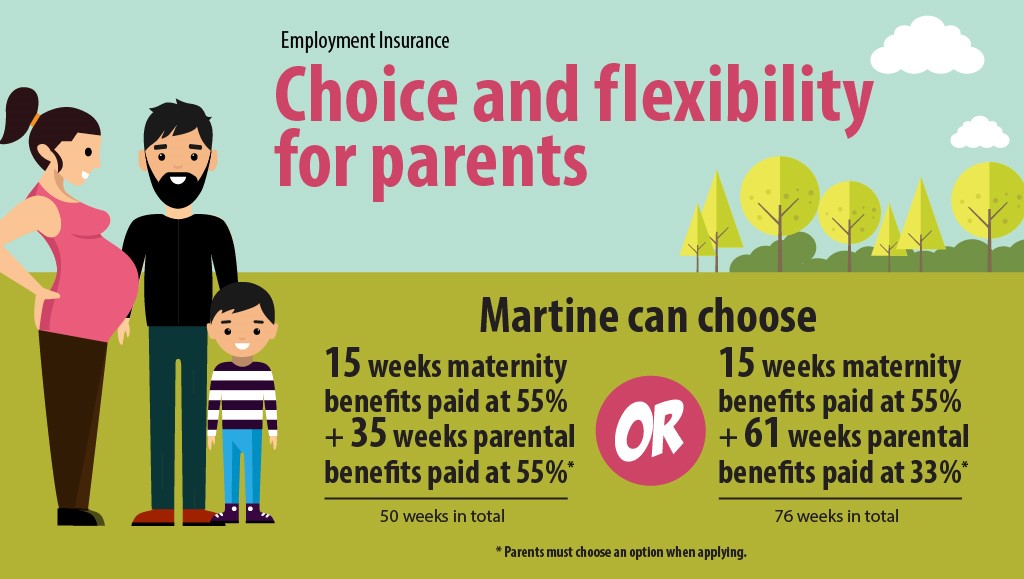
Example 3
Peter and Rohan plan to adopt a child. They decide to share the benefits. Peter will take the maximum number of weeks available per parent and Rohan will take the remaining weeks available. They can choose standard parental benefits (up to 40 weeks) or extended parental benefits (up to 69 weeks). Peter earns a yearly salary of $40,000 while Rohan earns $65,000 per year.
Option 1: Standard parental benefits
Peter receives $423 per week for 35 weeks (55% of his average weekly earnings). Rohan receives $562 per week for 5 weeks (55% of his average weekly insurable earnings). In total, they receive $17,615 in parental benefits over 12 months.
Option 2: Extended parental benefits
Peter receives $254 per week for 61 weeks (33% of his average weekly earnings). Rohan receives $337 per week for 8 weeks (33% of his average weekly insurable earnings). In total, they receive $18,190 in parental benefits over 18 months.
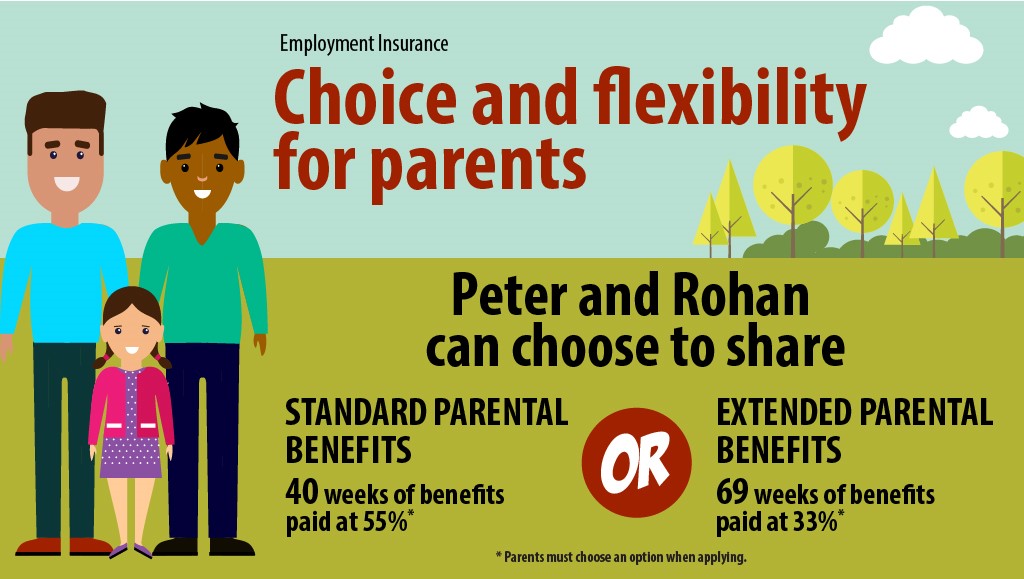
Example 4
Angela is a single mother caring for a four-year-old and is expecting her second child. She works part-time. Her annual household income is $21,000. She is eligible for the EI Family Supplement since her annual household income is less than $25,921.
Angela applies for maternity and parental benefits and stops working the week the baby is due.
Option 1: Standard parental benefits
Angela receives $289 per week in maternity benefits for 15 weeks, including the Family Supplement; then she receives $289 per week in standard parental benefits for 35 weeks (55% of her average weekly earnings, including the Family Supplement).
In total, over 12 months, she receives $14,450 in maternity and standard parental benefits, including the Family Supplement.
Option 2: Extended parental benefits
Angela receives $289 per week in maternity benefits for 15 weeks, including the Family Supplement; then she receives $200 per week in extended parental benefits for 61 weeks (33% of her average weekly earnings, including the Family Supplement).
In total, over 18 months, she receives $16,535 in maternity and extended parental benefits, including the Family Supplement.
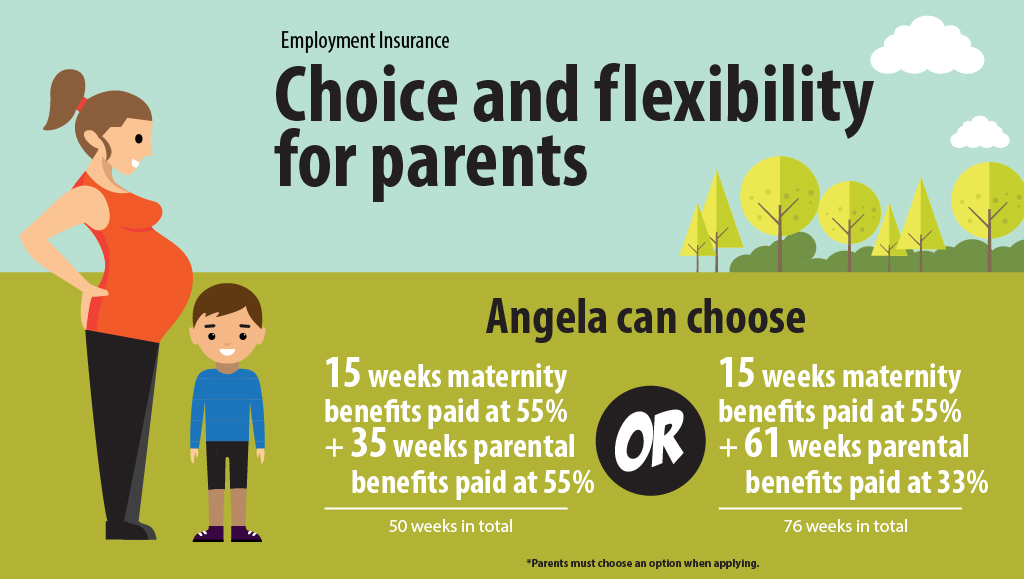
Page details
- Date modified: